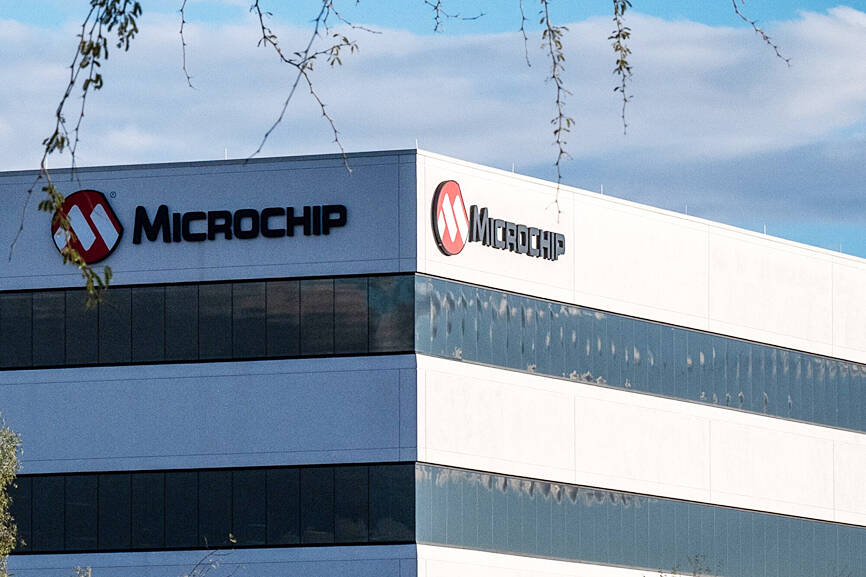Microchip Technology Inc yesterday said it has deepened its partnership with Taiwan Semiconductor Manufacturing Co (TSMC, 台積電), eyeing the foundry giant’s 40-nanometer manufacturing capacity at its Japanese fabs.
Microchip, a supplier of microcontroller units based in Chandler, Arizona, said the wafer capacity at Japan Advanced Semiconductor Manufacturing Inc (JASM) would improve its supply chain resilience and boost its ability to serve global customers regarding their automotive, industrial and networking applications.
JASM is TSMC’s 85 percent-owned manufacturing subsidiary in Kumamoto Prefecture.

Photo: Bloomberg
“Microchip’s reputation for providing responsible and reliable supply management is enhanced with this new TSMC manufacturing path,” Microchip senior vice president of worldwide manufacturing and technology Michael Finley said in a statement.
“Customers can have confidence when designing our products into their applications and platforms, with the support of resilient and robust manufacturing capabilities,” Finley said.
The partnership with TSMC would also ensure that customers have sufficient supply in the face of external factors such as frequently changing business conditions and natural disasters, Microchip said.
“This initiative with Microchip is further proof of TSMC’s commitment to supporting our customers’ long-term growth and innovation,” TSMC North America senior vice president of business management Rose Castanares said in the statement.
JASM’s first Kumamoto fab is scheduled to enter mass production in the fourth quarter, focusing on 40, 28, 16 and 12-nanometer chips.
The firm plans to begin construction of a second fab there by the end of this year to make advanced 6 and 7-nanometer chips.
The two Kumamoto fabs combined are expected to produce more than 100,000 12-inch equivalent wafers per month for automotive, industrial, consumer and high-performance computing applications.

When an apartment comes up for rent in Germany’s big cities, hundreds of prospective tenants often queue down the street to view it, but the acute shortage of affordable housing is getting scant attention ahead of today’s snap general election. “Housing is one of the main problems for people, but nobody talks about it, nobody takes it seriously,” said Andreas Ibel, president of Build Europe, an association representing housing developers. Migration and the sluggish economy top the list of voters’ concerns, but analysts say housing policy fails to break through as returns on investment take time to register, making the

‘SILVER LINING’: Although the news caused TSMC to fall on the local market, an analyst said that as tariffs are not set to go into effect until April, there is still time for negotiations US President Donald Trump on Tuesday said that he would likely impose tariffs on semiconductor, automobile and pharmaceutical imports of about 25 percent, with an announcement coming as soon as April 2 in a move that would represent a dramatic widening of the US leader’s trade war. “I probably will tell you that on April 2, but it’ll be in the neighborhood of 25 percent,” Trump told reporters at his Mar-a-Lago club when asked about his plan for auto tariffs. Asked about similar levies on pharmaceutical drugs and semiconductors, the president said that “it’ll be 25 percent and higher, and it’ll

CHIP BOOM: Revenue for the semiconductor industry is set to reach US$1 trillion by 2032, opening up opportunities for the chip pacakging and testing company, it said ASE Technology Holding Co (日月光投控), the world’s largest provider of outsourced semiconductor assembly and test (OSAT) services, yesterday launched a new advanced manufacturing facility in Penang, Malaysia, aiming to meet growing demand for emerging technologies such as generative artificial intelligence (AI) applications. The US$300 million facility is a critical step in expanding ASE’s global footprint, offering an alternative for customers from the US, Europe, Japan, South Korea and China to assemble and test chips outside of Taiwan amid efforts to diversify supply chains. The plant, the company’s fifth in Malaysia, is part of a strategic expansion plan that would more than triple

Taiwanese artificial intelligence (AI) server makers are expected to make major investments in Texas in May after US President Donald Trump’s first 100 days in office and amid his rising tariff threats, Taiwan Electrical and Electronic Manufacturers’ Association (TEEMA, 台灣電子電機公會) chairman Richard Lee (李詩欽) said yesterday. The association led a delegation of seven AI server manufacturers to Washington, as well as the US states of California, Texas and New Mexico, to discuss land and tax issues, as Taiwanese firms speed up their production plans in the US with many of them seeing Texas as their top option for investment, Lee said. The